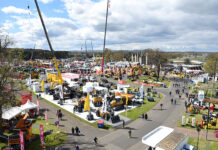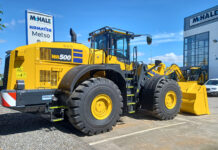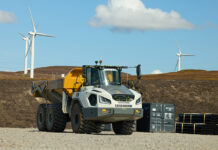
MARK Ormond was appointed managing director of Manitou UK last year, having spent the vast bulk of his career in the agriculture sector.
He recently joined the Construction Equipment Association’s management council, and has a long association with involvement in trade bodies.
Mark told Project Plant why he prefers working for family businesses, the importance of the Scottish market, and the similarities and differences he’s found between the construction and agricultural sectors…
Q) What’s your background? How did you break into the plant industry?
A) I grew up on a family farm and attended agricultural college before going back to join the family business. After a few years, I decided the farm was not big enough to support two families, so I moved to a career in agricultural machinery sales.
Initially, I worked in dealer sales, followed by 20 years working with farm machinery manufacturers. Immediately prior to Manitou, I was MD of Same Deutz-Fahr UK, which is the sales subsidiary of an Italian family-owned tractor and combine manufacturer.
Q) How long have you been MD of Manitou UK? What were your initial impressions of the company and what have been your biggest achievements so far?
A) I joined Manitou as MD in February 2018. It was an opportunity to manage a larger business unit and to extend my knowledge into areas outside of agricultural machinery.
I chose Manitou because it is a family-owned business. Throughout my career, I have always chosen to work with family businesses as I feel they are much more dynamic, forward thinking, and customer focused. They are not burdened by the need to deliver regular shareholder dividends. They tend to invest more and plan for long-term sustainable growth. They also tend to be much more focused on the customer experience, recognising that satisfied customers will be more likely to recommend them to others, and to be repeat customers themselves.
Manitou has certainly lived up to my expectations. Although the Manitou Group turned over nearly €1.9 billion in 2018, and has production plants in Europe, USA, and India, it is a family business. The founder’s sister is currently chairman of the board, and her husband was the founder of Manitou UK and Manitou Finance UK. They are interested in our market, regularly visit the UK office, and ensure that the company recognises the needs of the UK and Irish market.
In terms of biggest achievements, it has to be our significant increase in sales turnover and market share in the UK market, a market in which our biggest global competitor has its home.
Q) How important is the Scottish market to Manitou? Do you see further potential to expand the business north of the border?
A) The Scottish market is very important to Manitou. It is a big market for plant equipment and we have an excellent market share there. We have a very strong dealer network in Scotland, most who have been working with Manitou for many years. Whilst some focus entirely on construction machines, most of our Scottish dealers promote our entire product range including construction, agriculture, access platforms, and industrial forklifts. Such dealers offer real customer benefit because they live and breath Manitou on a daily basis. They carry machine and parts stock, invest heavily in training, and ensure the customer receives the best possible service.
A current expansion area is in the access platform sector. We are increasing sales of these products globally and Scotland is no exception. I am sure we will see further sales growth here in future.
Q) I understand your background is in agriculture. What are the biggest differences, and also the biggest similarities, you’ve found between that sector and construction?
A) Naturally, there are differences between construction and agriculture. However, at the end of the day, the customer has the same basic demands. Correct specification for the task, reliability, excellent after-sales support, and value for money.
Downtime is a key issue in both sectors. Farmers tend to be very seasonal and operate their machines very intensively for short periods of the year. Their expectations are high and they demand reliability and quick response times for after-sales needs.
Construction customers are often rental companies. As such, downtime cannot be accepted by their customers. They need reliable machines and quick service response.
Another similarity is TCO (Total Cost of Ownership). Both sectors are professional business and, as I’ve said above, want reliability and good after-sales. They tend to realise the cheapest machine may not be the best provider of these. In both agriculture and construction, customers are now looking more at whole life costs. They want extended warranty, maintenance contracts, and the confidence of good residual values. High reliability, excellent after-sales, and low TCO are the features that have supported Manitou’s market share growth in recent years.
In terms of differences, the main one is that a farmer is often the operator, whilst the construction customer will usually rent it out or put an employee on the seat. Therefore, the cab specification tends to be very different on agricultural versus construction machines.
Ultimately, both sectors want the best possible machine for the lowest possible TCO.
Q) Is there anything the construction equipment sector could learn from the agricultural industry in your opinion?
A) Now that’s an interesting one. I think they work in very similar ways but in different market sectors. The biggest difference is customer mentality.
Historically, agriculture has been more of a ‘lifestyle’ business. Whilst there are many large arable farms that are truly business-focused, smaller farms have prioritised animal and crop care over business factors. Making money was a secondary priority for them but has become much more important as margins have been squeezed over the last 20 years. Many small farms have been swallowed up by larger ones where business management is as important as animal and crop care. Construction has been a ‘business-focused’ industry for many years, and today the two are very similar. Both are people businesses. They each prefer to deal with suppliers that they know and trust. That is another reason that customers like dealing with Manitou. They get to know the management, and family shareholders can often be found talking to customers at shows or in our factories.
Q) What do you see as the biggest challenges and opportunities facing the sector at the moment?
A) As I’ve said already, reliability and TCO are key factors when purchasing a machine(s). Customers continually want to do more work with less machines. There is a focus on ‘up time’.
Technology has helped enormously with this. Manitou now provides telematics as standard on most models. That offers benefits to both customer and dealer. The dealer service department can monitor machines remotely, plan routine servicing according to the best time for the customer, and see faults before they develop symptoms. That enables preventative maintenance to ensure faults are remedied before they cause any machine downtime.
For larger customers, particularly rental companies, they can see where their machines are, what they are doing, and when. There are no surprises when machines are returned from hire.
Q) You’ve just been appointed to the CEA management council. How important do you believe these kind of organisations are? What do you hope to achieve in this role?
A) I am a great believer in trade associations. They allow manufacturers to share best practices, and present an industry voice to government, EU organisations, and other such groups. Individual manufactures have no ability to steer legislation, but well informed and funded trade associations can do. That helps manufactures and our customers.
There is an equivalent association, called the AEA, that represents UK agricultural machinery manufacturers. I have sat on its Farm Equipment Council for many years, was elected to the board in 2013, and was its president from 2017 to 2018. My experiences there showed me how valuable a trade association can be but, like many things in life, you get out what you put in. Therefore, if Manitou is to truly benefit from its membership of the CEA, we have to invest time in it. I look forward to doing just that in the future.
Q) What’s the best advice you’ve ever received?
A) You’ve got two ears and one mouth. Use them in that proportion, and you will do well in life and career.
Q) Any funny anecdotes from your career?
A) I have been lucky enough to work in a number of international roles in my career. I remember receiving a personal phone call from an English friend one day. My answer was, “I can’t really talk at the moment. I’m down a hole, in a field in Sweden, educating a group of French farmers about the importance of soil structures.” He said he knew I had an interesting job but struggled to piece that picture together in his mind.
Q) How do you relax in your spare time?
A) I am very lucky to thoroughly enjoy the job I do. That means I spend a very large part of my waking hours doing that job.
However, I do enjoy cycling at the weekend. It is something that the whole family can enjoy. My wife, two adult sons, and I are all members of the local cycling club and normally spend at least one day per weekend out cycling with friends in the club.












